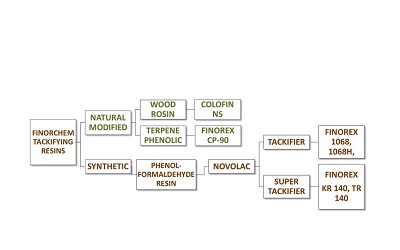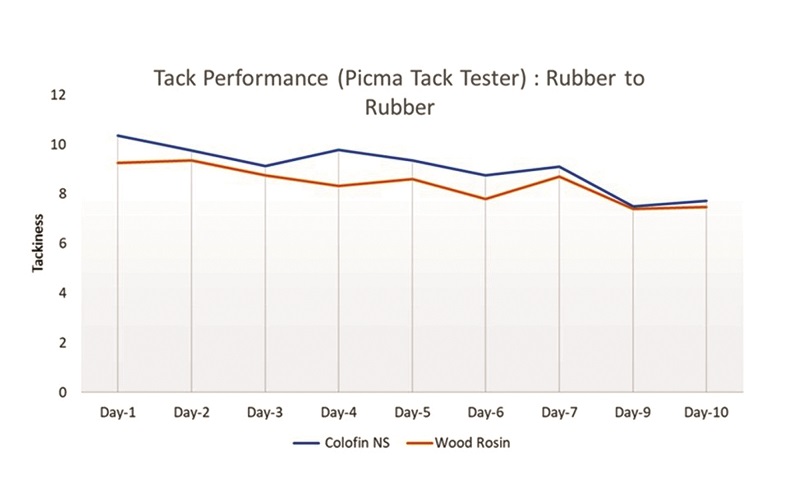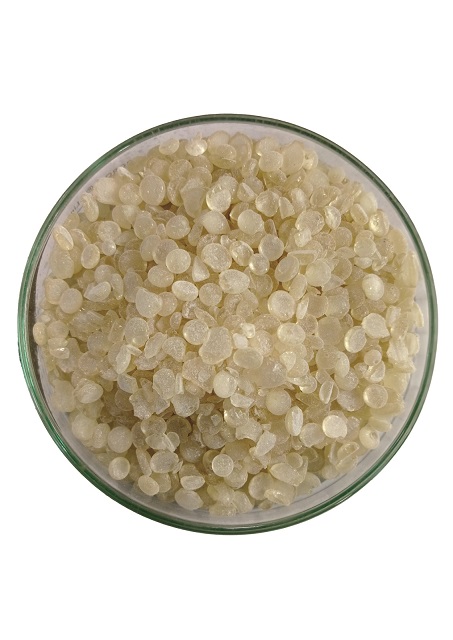Finorchem’s Tackifying Resins: The Science Behind Advanced Adhesion, Performance And Sustainability
- By TT News
- July 07, 2025

Tackifying resins or tackifiers are versatile organic substances with low molecular weight, high glass transition temperature and a softening temperature above room temperature. They exist as solid materials, derived from certain trees or chemically synthesised. Tackifiers can be broadly classified as natural (rosin-based and terpene-based) and synthetic (C5 & C9 based aliphatic or aromatic hydrocarbon and coumarone-indene) and, finally, phenol-formaldehyde condensation resins.
 Phenolic tackifiers enhance adhesion by promoting superior surface contact and intermolecular interactions with rubber substrates, ensuring high initial tack and long-term retention. Unlike general tackifiers that rely primarily on weak Van der Waals forces, phenolic resins offer exceptional cohesion, heat resistance and humidity stability, making them ideal for demanding applications. Their low loading levels minimise heat build-up, optimising processing efficiency while preserving physical, dynamic and rheological properties. Additionally, phenolic tackifiers demonstrate remarkable stability and environmental compatibility, ensuring consistent performance without compromising formulation integrity. This balance of adhesion strength, thermal durability and sustainability makes them a preferred choice in rubber compounding.
Phenolic tackifiers enhance adhesion by promoting superior surface contact and intermolecular interactions with rubber substrates, ensuring high initial tack and long-term retention. Unlike general tackifiers that rely primarily on weak Van der Waals forces, phenolic resins offer exceptional cohesion, heat resistance and humidity stability, making them ideal for demanding applications. Their low loading levels minimise heat build-up, optimising processing efficiency while preserving physical, dynamic and rheological properties. Additionally, phenolic tackifiers demonstrate remarkable stability and environmental compatibility, ensuring consistent performance without compromising formulation integrity. This balance of adhesion strength, thermal durability and sustainability makes them a preferred choice in rubber compounding.
Para-tertiary octyl phenol formaldehyde (PTOP) resin is a high-performance phenol-formaldehyde resin, widely utilised in rubber applications, coatings and adhesives as an industrial tackifier. PTOP resins are preferred tackifiers due to their ideal molecular weight, polarity and superior compatibility with rubber matrices, ensuring strong adhesion through hydrophobic interactions. Their octyl chain length facilitates optimal softening, enhancing wetting, green strength and cohesion.

The effectiveness of these resins is influenced by fillers that reduce tack, while PTOP enhances tack through improved interfacial bonding. Excessive oil incorporation can diminish tack by disrupting resin-rubber interactions. Balancing superior adhesion, thermal stability and process efficiency, PTOP resins remain indispensable in demanding industrial formulations.
Finorchem offers a diverse range of high-performance tackifying resins, catering to various rubber applications. Finorchem’s commitment to innovation and sustainability ensures a superior range of tackifying resins, tailored to meet the evolving demands of rubber compounding and industrial applications. Through precisely engineered formulations, Finorchem delivers exceptional adhesion performance, green tack enhancement and process optimisation, offering a strategic advantage in manufacturing. From PTOP-based FINOREX series to sustainable terpene and wood rosin resins, each solution reflects a dedication to quality, efficiency and environmental responsibility.

For naturally obtained sustainable tackifying solutions, Finorchem provides COLOFIN NS, a modified wood rosin resin in pastille form, and CP-90, a terpene-phenol-based resin derived from pine tree. Colofin NS enhances rubber processing efficiency with free-flowing, non-sticky pastilles, minimising manual handling, cracking, enabling automated weighing and serving as a sustainable tackifier alternative to rosin and synthetic options. These resins also enhance green tack, filler incorporation and stock flow, making them cost-effective choices for rubber products like tyres, hoses, belts, footwear, flooring and moulded goods.

 FINOREX 1068 & FINOREX 1068H, based on PTOP novalac resins, deliver exceptional tack properties with high initial tack and longer tack retention, particularly in synthetic rubber formulations. The difference between the two lies in their softening points, allowing flexibility in application.
FINOREX 1068 & FINOREX 1068H, based on PTOP novalac resins, deliver exceptional tack properties with high initial tack and longer tack retention, particularly in synthetic rubber formulations. The difference between the two lies in their softening points, allowing flexibility in application.
Additionally, FINOREX KR 140 & FINOREX TR 140, developed with para- tertiary butyl phenol & aldehyde-based novalac chemistry, offer superior tack performance under severe environmental conditions, outperforming PTOP-based tackifying resins. Their high softening point ensures sustained tack retention, making them ideal for ENR (Epoxidized Natural Rubber) compounds with high silica content and rubber cushion formulations requiring durability under severe loading conditions.
By integrating cutting-edge tackifying technologies, Finorchem strengthens the durability and reliability of rubber articles under challenging conditions, making them an indispensable partner in high-performance applications. As industries seek sustainable, high-impact solutions, Finorchem remains at the forefront – bridging advanced science with industrial excellence, shaping the future of rubber adhesion. The dedicated chemists and scientists at Finorchem’s state-of-the-art Technology Innovation Centre – featuring an NABL-accredited Chemical Synthesis Lab, Analytical Development Lab and Rubber Application Centre – continue to drive advancements, shaping better prospects for the future.
Author: Tamsuk Goswami – Senior Manager, Product Management & Marketing at FInorchem.
wdk Warns German Rubber Industry At Risk Amid Fifth Year Of Decline
- By TT News
- February 21, 2026

Germany's rubber industry continues to face significant headwinds, with fresh data from the German Rubber Industry Association (wdk) revealing a persistent downturn. The figures show employment falling for the fifth year in a row, while production levels have declined for the fourth consecutive year, underscoring the sector's struggle to regain its footing.
The association attributes this stagnation to waning enthusiasm for German rubber goods in both domestic and international markets. Michael Berthel, wdk Chief Economist, described a fundamental shift in procurement behaviour, even within Germany. He noted that purchasing decisions are now driven almost exclusively by price, a stark departure from the historical emphasis on quality and reliability. This change has opened the door to intense international cost competition, placing immense pressure on Germany's medium-sized suppliers. Berthel highlighted that prohibitive domestic costs related to energy, bureaucracy, taxation and labour make it nearly impossible for these firms to compete effectively. Consequently, many are compelled to relocate their investments abroad as a necessary escape from these local burdens, even though their preference would be to maintain and revitalise their operations within Germany after years of strategic transformation.
Against this backdrop, wdk President Michael Klein issued an urgent appeal to the federal government. He acknowledged that the broader struggles of German industry are well documented but stressed the immediate need for decisive political intervention. Klein called for concrete measures to stimulate demand and bolster the nation's competitive edge within Europe without further delay. He warned against allowing the rubber sector to decline quietly, emphasising its critical role in essential areas such as healthcare, infrastructure, security and mobility.
Punia Metox Starts Production At Tirupati Facility
- By TT News
- February 19, 2026

Punia Metox Private Limited has commenced production at a new manufacturing facility in Thottambedu, Tirupati, Andhra Pradesh, with operations starting on 12 February 2026.
The plant has an initial production capacity of 12,000 tonnes a year. Its structural design allows capacity to be doubled within four to six months, providing scope for rapid scale-up as demand grows, the company said.
Punia Metox said the facility has been equipped with modern technology to support operational and energy efficiency, safety, sustainability and consistent product quality. The company added that the plant has been designed to enable smooth and seamless operations from the outset.
The expansion forms part of Punia Metox’s strategy to align capacity growth with customer requirements and strengthen its position as a long-term supply partner. The company said the new unit reflects its focus on customer satisfaction, ethical business practices and value-based growth.
Cabot Expands Circular Carbon Production To Asia-Pacific
- By TT News
- February 19, 2026

Cabot Corporation said it can now produce circular reinforcing carbons in the Asia-Pacific region after validating manufacturing capability at its plants in Cilegon, Indonesia, and Tianjin, China.
The materials are produced using tyre pyrolysis oil derived from end-of-life tyres and an International Sustainability & Carbon Certification (ISCC) PLUS mass-balance approach. With the addition of the two Asian sites, Cabot said it now has circular reinforcing carbon production capacity across Asia, Europe and the Americas.
Tyre manufacturers are pursuing targets to increase sustainable material use in tyre production, with many aiming for 40 per cent by 2030 and 100 per cent by 2050, the company said. Cabot’s circular reinforcing carbons are designed as a drop-in replacement for conventional carbon black, allowing manufacturers to increase sustainable content without affecting tyre performance.
Aatif Misbah, Vice-President and General Manager for sustainable solutions in Cabot’s reinforcement materials segment, said: “This achievement reflects our deep commitment to delivering sustainable solutions across Asia Pacific and globally. Scaling our circular reinforcing carbon capabilities helps strengthen our role as a trusted partner to the tire industry, while helping to drive meaningful sustainability progress. Looking ahead, we remain focused on supporting our customers’ evolving needs and helping enable a more sustainable future.”
Cabot’s facilities in Ville Platte, Louisiana; Mauá, Brazil; and Valasske Mezirici in the Czech Republic had previously demonstrated circular reinforcing carbon production capability. The products are ISCC PLUS-certified and marketed under the recovered category of Cabot’s EVOLVE Sustainable Solutions platform.
The company said it has 13 ISCC PLUS-certified sites supporting circular reinforcing carbon production across Asia, Europe and the Americas, along with two certified masterbatch and compounding sites in Europe.
- Rathi Group
- Indian Tyre Technical Advisory Committee
- ITTAC
- Automotive Tyre Manufacturers’ Association
- ATMA
- Recovered Carbon Black
- rCB
Rathi Group And ITTAC Sign MoU To Advance rCB Integration In Tyre Manufacturing
- By TT News
- February 18, 2026

The Rathi Group has formalised a partnership with the Indian Tyre Technical Advisory Committee (ITTAC) through a Memorandum of Understanding aimed at advancing technical collaboration on recovered carbon black (rCB). The agreement focuses on the responsible integration of rCB into tyre manufacturing, with an emphasis on detailed evaluation and enhancement of its material properties. This initiative will be driven through structured engagement between industry and academia, supported by ITTAC’s technical expertise.
The collaboration is facilitated by the Automotive Tyre Manufacturers’ Association (ATMA) and ITTAC, which have brought together leading technical experts, tyre manufacturers and research institutions on a unified platform. Their coordinated efforts are fostering a science-based approach to accelerate the assessment and adoption of circular materials within the tyre sector. This partnership is seen as a significant step in strengthening industry–academia linkages to advance sustainable practices.
Through this alliance, the Rathi Group aims to contribute to the evolving landscape of tyre-to-tyre circularity. The joint initiative underscores a shared commitment to developing innovative solutions that support environmental responsibility while maintaining technical performance standards in tyre applications.







Comments (0)
ADD COMMENT